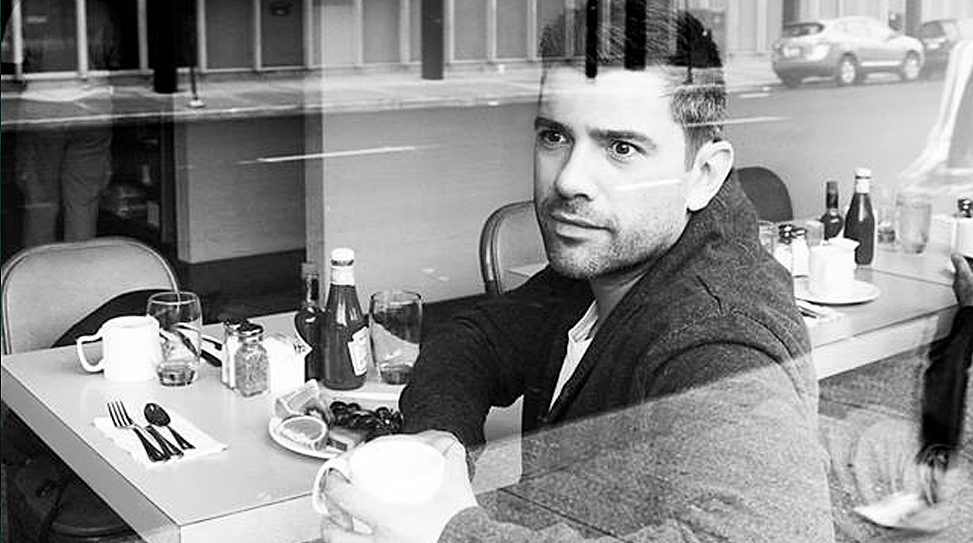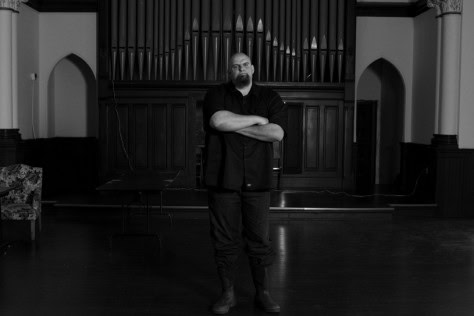Sitting on the docks in Barcelona, eating Paella with fishermen, was more rewarding than spending x amount of days in a culinary class.
Anyone with a family knows that settling down means stepping things up. When it comes to food, it means changing the way you eat for the better. This is certainly reflective of Danny Boome — chef and one-time host of Food Network’s Rescue Chef and ABC’s Recipe Rehab — who recently became a father. It wasn’t long-term planning that led Boome on the culinary path, at least not consciously so. The former semi-professional athlete skated away from hockey to become an au pair, which saw his culinary aptitude swell with little lessons adding up to one hell of a first-rate education. Boome’s route up the ladder has been a process of self-discovery carried out in public, on the plate, and evaluated by everybody from critics to those who opine on the Internet.
Despite the glamor attached to the profession today, a successful life for a chef in the kitchen seems to be determined more by sacrifice than stardom, which demands a dedication that borders on obsession. And while it’s true that chefs come and go, contributing what they can to the continuum, they are players in something much larger than themselves. On his newest hosting duty on the culinary travel series Good Food America, the charismatic Brit continues to push himself to challenge the way he, and we, think about healthy eating and sustainable food practices. Curious to find out more, Anthem caught up with Boome to discuss dishes that get the most play at home, what really goes on behind-the-scenes at Food Network, and his ongoing creative development.
What are you up to these days, Danny?
Well, my wife and I had a baby four months ago. It’s the weirdest thing to have ever happened to me, and the best thing obviously. It’s been a wild ride, just the pressures and the strains that come with pregnancy and the stress of labor. It’s kind of funny how everything that’s said actually happens, like when the baby is puking on you and pooing on you. Also, the “crazies” as they call it when you have that chemical imbalance with the ladies after pregnancy. People warn you about it or you read about it, but when it actually happens, you either know how to handle it or you’re blindsided by it. All in all, the hardest thing I find is being away from it all.
How has the new family unit changed things when it comes to diet?
It changed everything, meal-wise and nutrition-wise. At the end of last month, I actually started a blog, MacDanny the Nanny. And managing a family wasn’t new to me because that’s how I started out. I got my start in cooking as a male au pair in the Swiss Alps. During the first six weeks of pregnancy, we went through a complete dietary change. We reduced salt and dairy, and added a lot of protein. Then we basically went into a complete whole food diet, cut out a lot of meat and things like that. We eliminated all processed foods.
Was that very difficult to do? I know you’re very big on healthy living.
You just come to this realization in the first three weeks to a month that you’re on your own as a family unit. You begin to stockpile the fridge with frozen meals because you don’t have much time to cook or eat. You have to essentially create dishes that are ready to go. We went through everything from preparing frozen foods that we can just drop into a saucepan and looking to lots of stews. We obviously turned to new ingredients because we were trying to keep certain things out of our diet. We went gluten-free, so we made chicken pot pies and whatnot that catered to our needs. I will literally cook or prepare food three to four times a day when I’m at home. And although we don’t eat anything processed anymore, in those rare instances, we have to make a conscious choice about what we’re going to have. There are some gluten-free pizzas that we’ve found, for instance. It’s about asking, how many meals can you create that you can eat with one hand, using the same five to ten ingredients every day, without getting bored? It’s a big challenge.
You’ve racked up quite a long list of accomplishments over the years, and not just in the culinary world. Did you always have so much drive and ambition?
The only reason I got into food was so I could travel and that’s the honest truth. When I became a nanny, my dad didn’t really agree with my decision because I was an emerging semi-pro athlete at the time. But it wasn’t working out for me and I decided to move onto something else. I tried going back to school for advertising and marketing. I worked at a bank for a little while. I wasn’t quite sure what I wanted to do or what my path was. Once I discovered what flavor was and exposed to an environment where food is really appreciated, things began to take shape. Fifteen years ago, Britain was really behind in the cultivation of cuisine. Now it’s a leader. Traveling the world reminded why I’m here, which is to learn. I only went to culinary school for a month before dropping out. Sitting on the docks in Barcelona, eating Paella with fishermen, was more rewarding than spending x amount of days in a culinary class. Food allowed me go on this journey and when you get into anything, you want to become the best at it.
Spoken like a true athlete.
I knew I would be that competitive no matter what I touched. Working in a kitchen is really hard work. I was never going to be the next Gordon Ramsey or Marco Pierre White, but TV came along at the right time. I needed something to drive and food became my vehicle. They were looking for aspiring personalities at the time and I was very lucky to get the opportunity to do that. A lot of people are now saying that chefs are the new rock stars, until the next thing comes along of course. But for the time being, the content is out there and the audience is feeding that idea.
What can you remember about being on camera for the first time? What were some of the bigger lessons at the beginning of your career?
The thing is, no one really teaches you any of this stuff. A well-known broadcaster in the UK once said to me, “It’s 98% you and 2% performance.” When it comes to TV personalities, you can spot the fakes fairly easily. I think the first big lesson I learned was to just be myself because people buy into that. The first time I was in front of the camera was for Food Network Canada and it was a defining moment. It’s just weird because no one explained anything to me. No one teaches you about blocking or what those watercooler moments are. In my first three years of doing TV, I completely fumbled through it. Then I began working for Food Network in the U.S., which was seven years ago, and the training they gave me really helped form who I am today. From there, I went onto ABC and I really came into my own as a host. The other thing that people don’t realize about being a host is that we’re salesmen. If I can sell you content and keep you entertained, I’m doing my job. It’s also about informing and teaching. Unfortunately, the content we’re looking at these days is too demographically-charged and the learning part sort of takes a backseat. Even when the aim is to teach, it’s done in such a dumbed down way that it doesn’t inspire.
When it comes to Food Network, how are individual shows packaged with the hosts in mind?
When you walk into Food Network, they have a library of every cookbook that has ever been written. All of a sudden, you have more knowledge at your fingertips than you’ve ever had before. As a Food Network talent, you get the best research chefs working with you. There’s a lot of research and development poured into the recipes you want to create. These recipes get tested over and over again to make them foolproof, not to mention budget-conscious. They’re quite meticulous over there as you can imagine. Then it’s about, how do you deal with the press? How do you work with a scriptwriter who’s there to create your voice? How do you work with an executive producer who’s trying to figure out what the network’s needs are and what kind of content the program should generate? Simply, how can you make everyone involved happy?
How about some behind-the-scenes dirt?
It’s very controversial for me to say this, but I won’t name names. Some chefs simply don’t put the necessary work in. Some chefs don’t know what they’re cooking when they show up on set. Sometimes, they don’t even know what they’re saying and there’s a disembodied voice feeding them information. That’s when it’s all about the personality. Fortunately, Food Network’s executive chef, Rob Bleifer, is an amazing teacher. Food Network has a great foundation of great leaders. Everyone is very passionate and very serious about what they do. Jacob Schiffman, the procure/kitchen manager, has access to absolutely any ingredient you can think of in the world. He can literally get you sixty pounds of reindeer antlers tomorrow if you wanted to test it out for a recipe. They taught me the refined skills in being concise and dealing with the media. At ABC, I was trained as a journalist, an actual reporter, which pulled out my personality even more. It taught me so much about the importance of storytelling, even when it has to do with recipes.
What’s your own palette like when it comes to comfort foods?
I became a vegetarian in the past year, but before that, I ate things that were very starchy, cheesy, and meaty. Mummy Boome’s Shepherd’s Pie is actually the number one searched recipe of mine on Google. Every family has their weekly meals planned out in advance and we’ve certainly had a Sherpard’s Pie night at home. As an easy, quick meal of comfort, it has all the flavors, textures, and great gravy — it’s beautiful! But fatherhood has changed me a bit because I now have a better understanding of what I’m putting in my body as we’re feeding our child. I used to be a big red meat eater. Eating meat four times a day turns out to be a phenomenal quantity of meat. I almost treated it like candy! My idea of comfort food these days would be fried quinoa with a medley of vegetables and a poached egg on top. It might sound posh, but it’s really quick.
What is Kefir?
Oh boy… Kefir is basically a probiotic yogurt drink. The thing I consume every day is Kefir, without fail. Believe it or not, I’m never ill when I’m drinking Kefir. If I go ten days without it, I start to feel ill. It’s sort of the weirdest thing in the world.
This is not product placement.
[Laughs] I’m also big on fruits and vegetables. I tend to eat kind of strangely because my job requires me to travel every day. I’ll probably have six to eight different meals on a given day, or tastings I should say. My appetite tends to get squashed because I won’t eat anything after four o’clock in the afternoon. I eat a big breakfast and a big lunch. Like I mentioned before, I don’t consume anything processed because I have no idea what it is or where it comes from. When you get this involved with food, you’re constantly made aware of what’s in our food chain. It’s quite sad, really. You walk into Whole Foods and think, this is the most organic-based food market in the country? They stock things that have no redeeming qualities because of all the colorings and chemicals. It’s obviously very educational and economically advantageous to eat as cleanly as you can, and this industrialized food chain we have is not helping. I know I might never get it completely right, but I’ll always try to eat the cleanest food I can, in whatever form it comes to me.
Who do you admire in the culinary world?
I would say Mario Batali because he’s such a pure force of nature in a business sense and in his respect for food. He took this model of Italian food and totally lives it and breathes it. Then you look at someone like Thomas Keller, who would never know who I am or who Paula Deen is, because he grows his own food and sources it himself. He’s a complete perfectionist. I have great respect for farmers, fishermen, hunters and gatherers in this country that work hard to deliver the best ingredients. They are the real heroes. But they’re continually raped by the government and being pushed out of their own market by imports. The farmers aren’t to blame for the pink slime in our burgers. It’s one of the five, big meat packers making those burgers. Farmers put their heart and soul into raising healthy cows. I’m always inspired to go out there and meet them.
Who’s getting it right? What do you see on your travels time and time again that you look to as a model for doing it correctly?
With this new show I’m doing now, I’m on the road for four months. I’m visiting 78 restaurants in 18 different states. Each state has its own identity and language, but a lot of people are doing the same things. We all want to know where our food comes from. There’s a strong vein of people who really respect artisans, farmers, fishermen and the like. The West Coast has different ingredients than the East Coast. Each coast has original seeds growing in their area and restaurants will put them to good use. I actually met this guy today who doesn’t cook a single thing in his restaurant and the flavors are amazing. He orders from this farmer who uses original seeds for heirloom tomatoes, potatoes, turnips, parsnips, and carrots. Everything is bursting with flavor. He has the same amount of passion for food that someone I meet in Portland, Oregon or Maine will have. Wherever you go, you find certain people putting a local twist on things. We’re all connected through food and that’s inspiring. I’ve been to the diviest bars, the most dangerous bars in the world, and when someone realizes I’m a cook, they appreciate that. And I thought they were coming over to kill me! [Laughs] An intimidating guy will tell me about his chili recipe and ask, “What can I do to make it better?” Sports used to be the common ground, but food is now a common ground.
Was it pretty brutal hosting Donut Showdown? How many donuts did you end up eating?
I only ate one donut during the entire show.
Shut up. How is that even possible?
Sheer discipline, Kee. At this point in my life, I’ve found that I have a gluten allergy. I had been trying to figure out what the problem is for a while. Honestly, I think you have to go a long way to make a bad donut… But there was this one guy who came in and I just had to try it because I’m fascinated by molecular gastronomy. He made this tobacco-sugared donut with a coffee mousse center — coffee and cigarettes. It was one of the most amazing things that I’ve ever tasted. Have I had donuts similar to that? Not in New York City, but maybe in Philadelphia at a placed called Federal Donuts. They have a mean selection. We went to check out a concert in Philly once and took a box home with us. I suffered the next day. [Laughs]
These competition shows obviously have so much to do with spotting talent. Have you ever come across someone that you wanted to take under your wings?
There was this one guy. I approached him and asked if he wanted an investor. I really believed in him a lot. He was making real, vegan donuts. Other than that, the people on this show were already established in their field. You’re there to compete, but these people got on the show because they have a name in the business already. Given my past life as a restaurant consultant, I’m more interested in seeking out the best health-conscious foods in America with Good Food America. I can tell you how long a certain restaurant is going to last, if it’s not hemorrhaging already. It’s similar to Ramsey’s Kitchen Nightmares in a way. You walk in and you know if a restaurant is impossible by looking at the staff and the cuisine offered on the menu. Those guys know, too. All in all, it’s always about asking, what can I make better? How can I make people’s lives better?

 These Here Are Crazy Times: A Warpaint Visual Tour Journal
These Here Are Crazy Times: A Warpaint Visual Tour Journal Diary: Braddock, Pennsylvania
Diary: Braddock, Pennsylvania
No Comments